Guide to electric cars in the UK in 2023
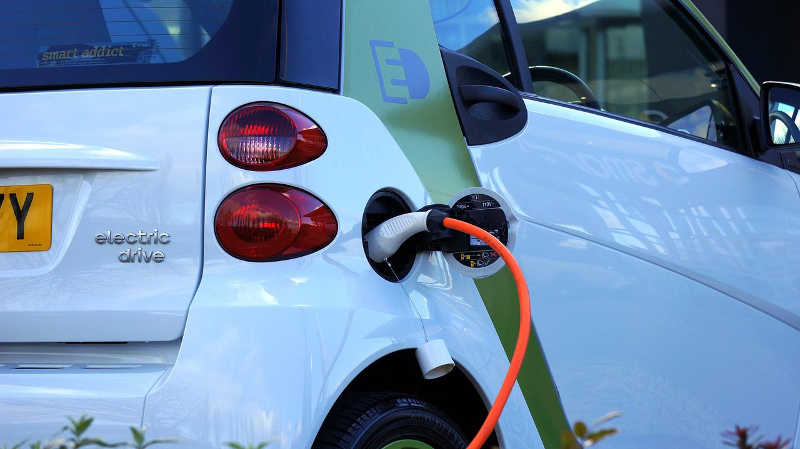

Electric Cars 2024 (The Complete UK Guide)

Whether you already own an electric vehicle, or are planning to get one, you've probable noticed that electric cars are just about everywhere at the minute. In fact, in the UK today there are approximately 400,000 Electric Vehicles (EVs) on the road, and they have about 750,000 cousins in the form of Plug-In Hybrid Vehicles (PHEVs). Suffice to say it, Electric Vehicles are getting faster, with better range, and are being sold in numbers greater than ever before. As petrol prices rise and Electric Vehicles become better and better, you might be thinking that now is as good a time as any to buy an EV.
What Electric Cars Are Available in the UK in 2024?
It's no suprise that Tesla holds the top spot for electric vehicles sales in the UK, with their new Model 3 maintaining a standard for beauty and performance at a great mid-range price for all its features, but there are many offerings out there in the market, each occupying an interesting niche within this fast-growing industry. So in the interests of saving you time, see below for the top 10 selling electric cars in the UK.
Top 10 Electric Cars
Here are the top 10 best selling Electric Cars this year. As you can see from the graph below, the Tesla Model 3 reigns above the other EVs with by far the most sales, but the runners up are relevant in their own right.
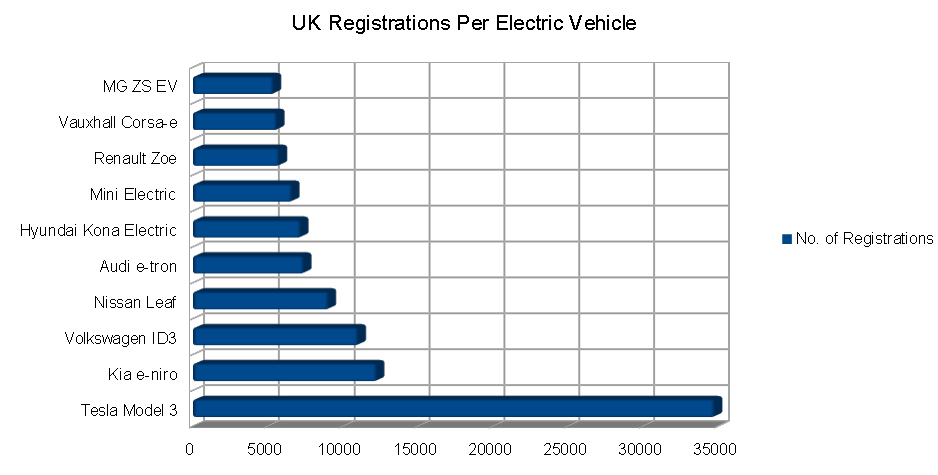
1. Tesla Model 3
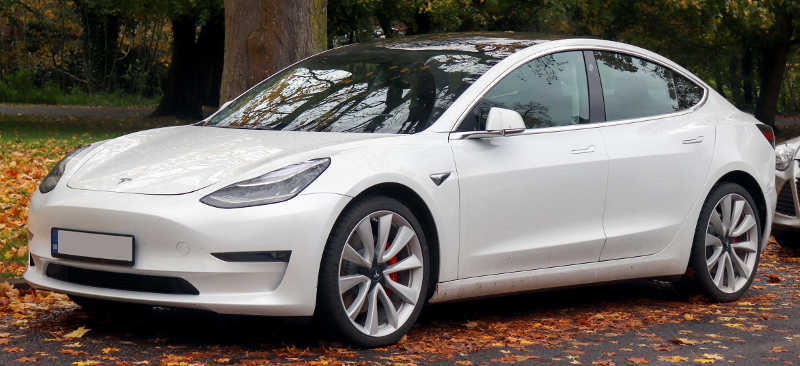
With over 35,000 sales in the UK so far this year, the Model 3 is the most affordable of Tesla's offerings, with the UK just starting to hop on the bandwagon of sales that has seen this car reach over a million sales more than a year ago. Despite this price, it offers great performance, with its Rear-wheel drive trim offering a range of 305 miles. This can be pushed further in the Long Range model can go up to 360 miles between charges, a great performance benchmark. While these numbers are still a long way off the 1,112 Miles of the popular Ford Focus, the battery technology used to power them is still incredibly impressive for the performance of the vehicle.
2. Kia e-Niro - 12, 271

With over 12,000 e-Niro's being sold this year, Kia have shown that it's possible to create a functional, decent-range SUV at an affordable price. When you couple the spacious interior, solid handling and smooth ride with Kia's proprietary technology, you get a car that will give you as much as you can take. While it may not have the range of the Tesla Model 3, its spaciousness, and decent
280 mile range more than makes up for it - especially considering the price starts at £32,895.
3. Volkswagen ID 3
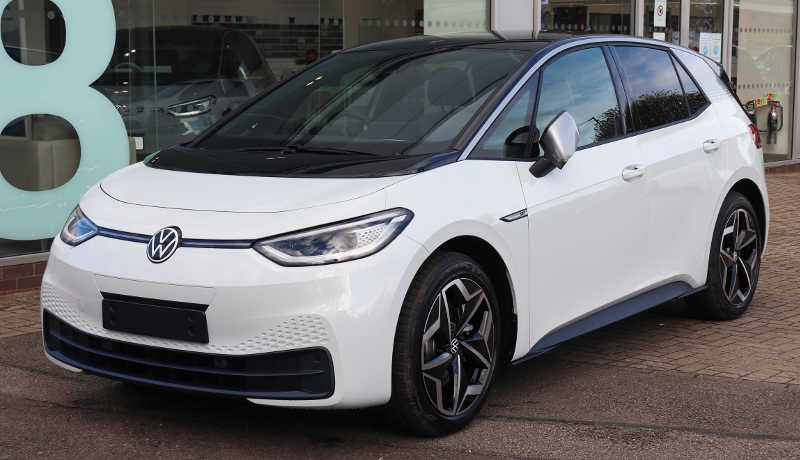
At 11,032 sales, the Volkswagen ID 3 is the electric equivalent of the highly popular Volkswagen Golf. It's slightly blocky but futuristic design may not be for everyone, but if you take two different ID 3s, they won't necessarily be the same under the bonnet. This is due to a number of motor and battery options, depending on whetehr or not you want a lower price or higher range. Starting at £32,200, the Volkswagen ID 3 is reasonably priced at the mid-end of the scale, whilst the ID 3 Tour Pro S model can reach a range further than 330 Miles. As the best selling electric family hatchback this year, the ID 3 is one to look out for.
4. Nissan Leaf
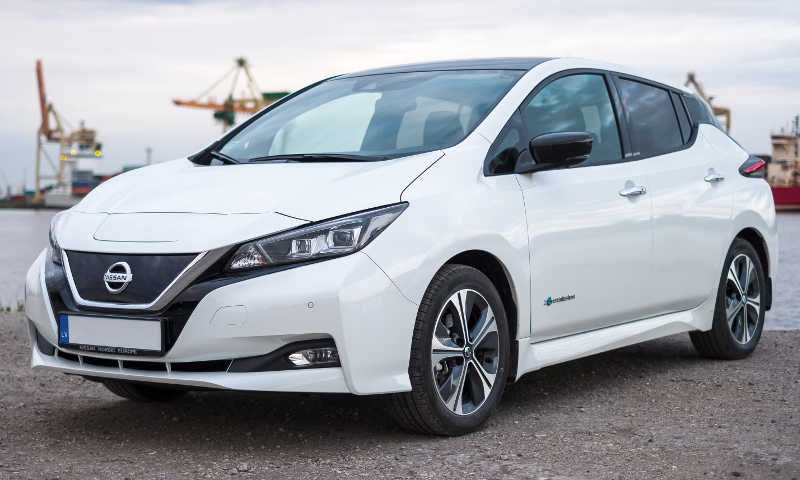
One of the oldest electric vehicle on the road today, the Nissan Leaf has been consistently sold well not only in the UK, but across the world as well. A new and improved second-generation update to the Leaf came out in 2017, with a focus on affordability. For those looking for a new EV that won't break the bank, the Nissan Leaf's starting price of £25,995 will look like an appealing offering. Of course, the range is only 168 miles for this model, but if you live in a city, this is unlikely to be an issue, especially as you can charge it at home. Simple, comfortable, and with a smooth ride, this family hatchback is practical and great value-for-money.
5. Audi e-tron
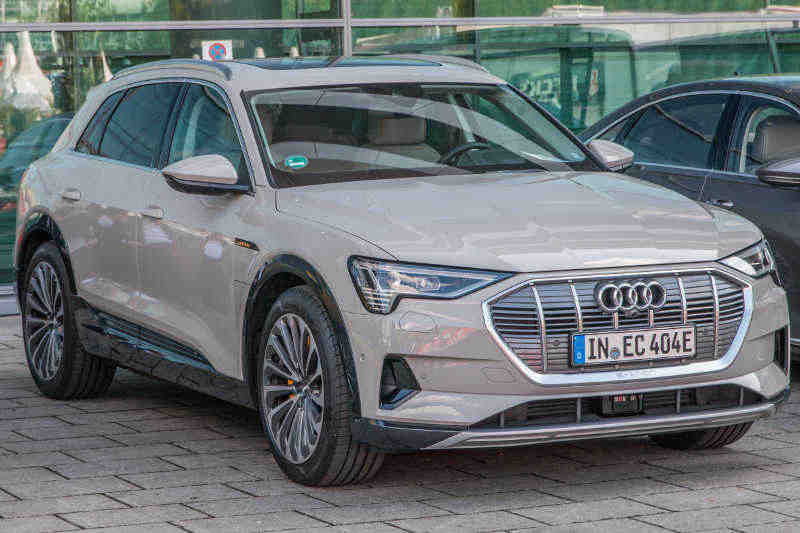
At more than 7400 sales, this large family SUV, Audi e-tron, holds a highly regarded spot in the electric vehicle industry. Despite its high price of £62,025, the Audi name and the sleek, classy styling make this car one of the more premium vehicles on the market. With sporty performance and a clean, angular design, the Audi e-tron range appeals to buyers seeking quality over saving money, with a charging time to 100% of only 50 minutes and a 0-62 mph speed of 5.7 seconds.
6. Hyundai Kona Electric

Making a good dent in the EV market at more than 7200 sales is the the Hyundai's hatchback crossover the Kona Electric, which is the electric version of their standard Kona. With prices beginning at £30,450 and more than 300 miles of range, the Hyundai Kona Electric is an electric car with gerat value for money. Coming with all the standard hatchback crossover traits like comfort and ease-of-driving, Hyundai have created a very strong contender for the EV market.
7. Mini Electric
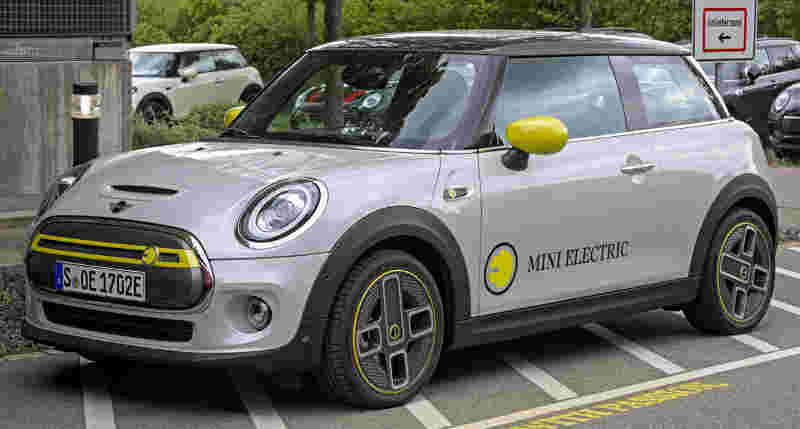
The electric version of the iconic Mini, the Mini Electric hops on the success bandwagon of Mini, selling more than 6600 times in 2021. More intriguingly, it marks the start of new era for Mini, as they have decided to make their entire future car ranges comprising solely of electric-only vehicles. With the same hatchback body and a panopoly of tech, the Mini Electric is comfortably priced from £27,000, although this low price comes with a small pitfall, which is a 145mile range. On the flipside, that makes it faster to charge, and a good vehicle for urban living, especially as a second car.
8. Renault Zoe
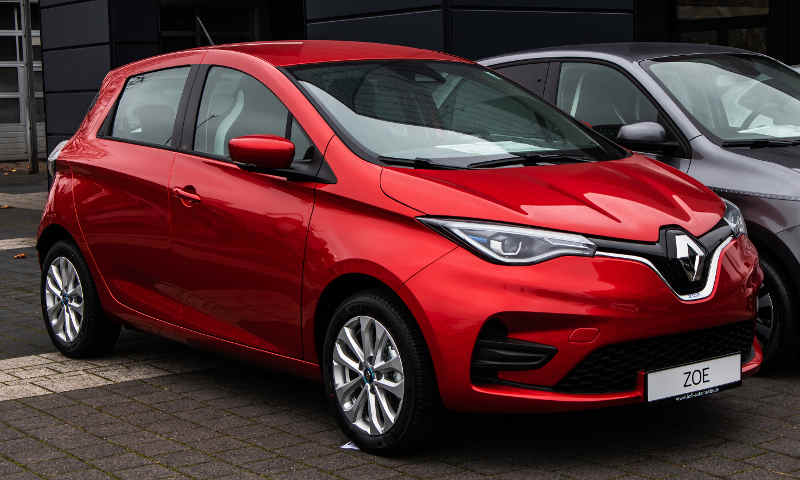
With nearly 6000 sales and a range of 245 miles, the sleek but compact and affordable Renault Zoe is a great budget option for those wishing to get a hatchback with range. Coming in at only £27,595 it's also a brilliant vehicle for those transitioning from traditional combustion-engine cars, as it has a similar driving feel. Unfortunately, the little Zoe has been stamped with a poor Euro NCAP safety test, making it a worrysome purchase.
9. Vauxhall Corsa-e
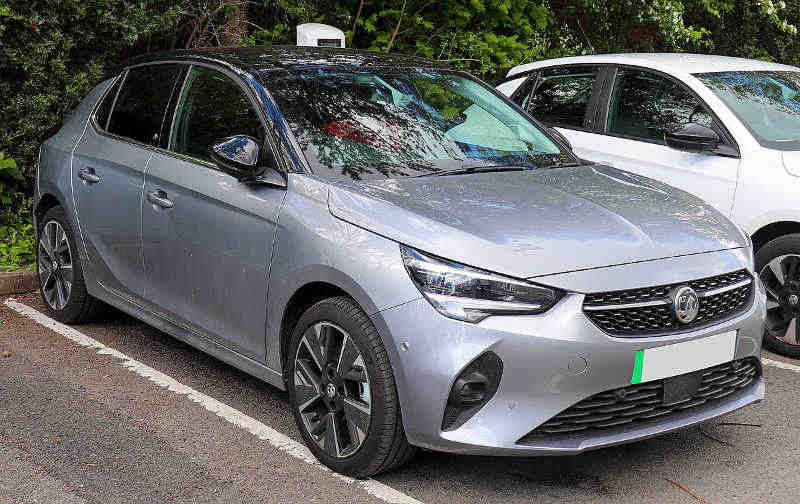
Designed after it's UK cousin, the high sales Vauxhall Corsa, the electric version comes through with similar value for money and a great number of standard features, including low running cost, comfortable seats, space and a decently sized boot, all within a reasonably compact frame. Coming in at £30,305, it might be considered a little pricey for an electric hatchback, but given its hearty 209 mile range and efficient batteries, the Vauxhall Corsa-e is a solid choice with few complications, with 5,600 sales to boot.
10. MG ZS EV
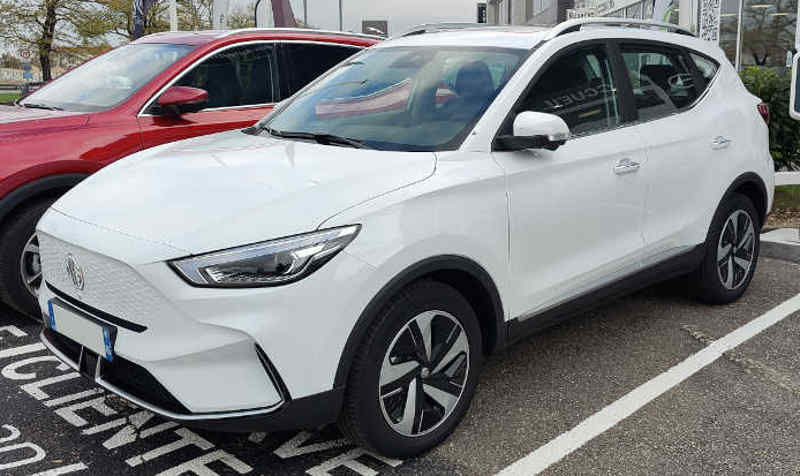
The [MG ZS is a family-sized SUV that offers great practicality – and had an electric supermini-sized asking price.
Starting from £26,095 the MG might not be the fanciest electric car you can buy, but it offers great value for money. It is very well equipped, the interior has a surprisingly classy feel thanks to plenty of soft touch materials, and it’s spacious for its size.
The 163 mile range isn’t the best, but that’s a trade-off many will accept for its comparatively low price and its other strengths.
What Electric Cars have the Longest Range in 2024?
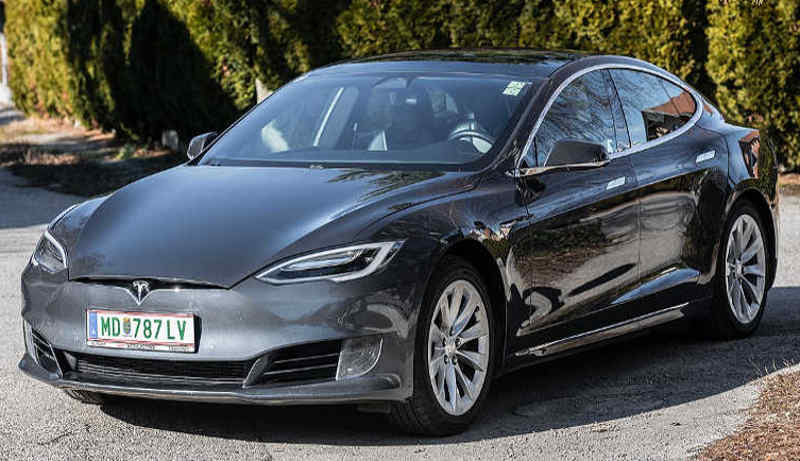
Here are the top 10 Electric Cars for Range in the UK in 2023.
Topping the list of Electric Cars with longest range is, unsurprisingly, the long range Tesla Model S, at a range of 405 for the long range version. But there are other competitors fighting for a clos second, so check out the comparison list of the range of cars vs. their prices below. As you'll find out, range often comes at a premium, although there are some exceptions, with the 300 mile range Hyundai Kona Electric coming in at only £37,000.
| Rank | Make | Range (miles) | Price (£) | ||||
|---|---|---|---|---|---|---|---|
| 1 | Tesla Model S | 405 | 74,000 | ||||
| 2 | BMW iX | 257-380 | 70,000-116,000 | ||||
| 3 | Ford Mustang Mach-E (long-range RWD) | 379 | 49,980 | ||||
| 4 | Tesla Model 3 | 305-374 | 43,000-50,000 | ||||
| 5 | Tesla Model X | 348 | 82,000 | ||||
| 6 | Volkswagen ID.3 | 340 | 42,600 | ||||
| 7 | Skoda Enyaq iV | 333 | 40,000 | ||||
| 8 | Porsche Taycan | 301 | 74,739 | ||||
| 9 | Hyundai Kona Electric | 300 | 37,000 | ||||
| 10 | Audi E-tron GT | 252 | 62,035-104,935 |
Where can I charge my electric vehicle UK?

It's one thing knowing that you can charge your vehicle at home, but it's another thing knowing where you can charge your vehicle when you're out and about. Furthermore, some vehicles require much more charge than others, with certain public chargers only supplying 3-5kW, while others can supply up to 350kW. From CCS Combo to Tesla Superchargers, and from Mennekes to Yazaki plugs, electric charging solutions are far from homogenised, so it pays to have an all in one solution. Fortunately, ZapMap has you covered. Just plug in your vehicle type and it will allow you to see every charger you can use, how much it will cost, and even whether or not the charger is vacant.
Are electric cars cheaper to insure?

Unfortunately not. Electric cars of a similar price point will cost more than their petrol or diesel equivalent because of the expensive-to-replace batteries. As supply chains get better, and car batteries become standardised, this will inevitably decrease, but until that point, insuring an electric car will be more expensive. Electric cars are also more expensive in general, and the more expensive the car, the more expensive the insurance.
Electric cars travel less distance - is this true?
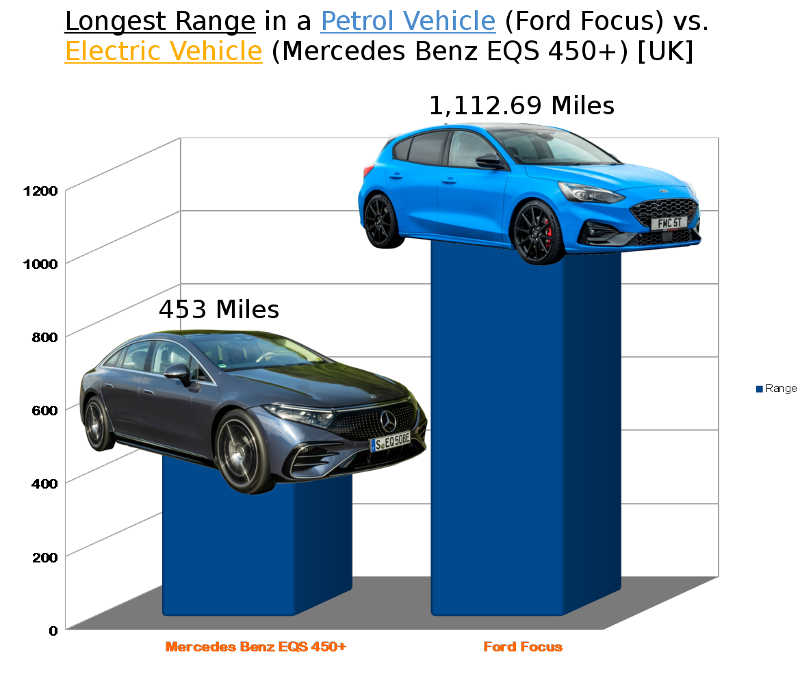
The Ford Focus is able to cover 1,112.69 miles on a full tank, making it one of the most efficient production cars in the world. On the flipside, the record breaking Mercedes EQS 450+ has a range of 453 miles on a single charge and costs nearly 5 times as much. So yes, it's true that electric cars can't trave l as far as petrol cars.
How are Electric Cars Charged?
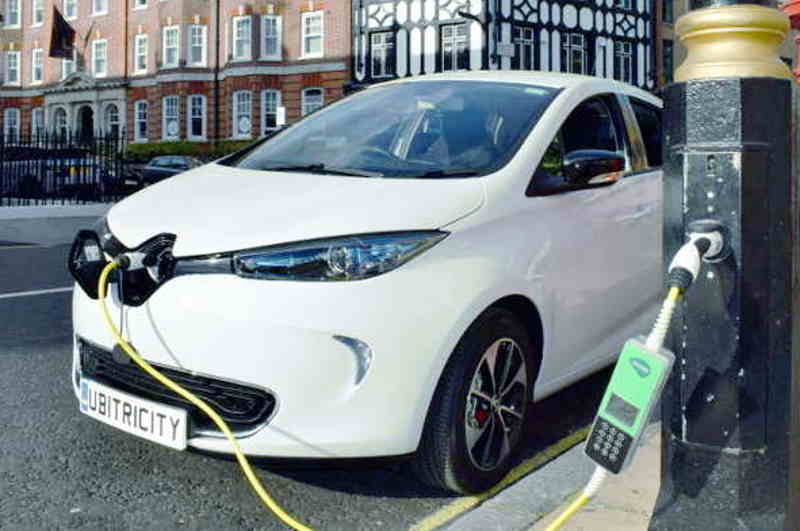
Electric cars are like any other battery powered device in that they're charged via the mains, either through your own house's electricity system, or in custom charging stations. If you're going to charge your electric car via the mains from the 110/240v dc system in your house, you'll need what is known as a "trickle charger", which is called that because it takes a very long time to charge up your vehicle, because the electrical system in your house cannot provide enough power to charge your EV quickly.
Fortunately, there are other available charging systems. Some charging systems are higher powered, and are often used as short-term charging solutions to quickly increase your vehicle charge. An example of this would be a Tesla Supercharger. Others have middling voltages, and are used to charge your EV moderately while it's parked, for example, while you're at work or while you're shopping. Different cars use different charging systems, so it's worth doing your research before deciding to charge your EV at a random EV Charger. Types of charger include CCS Combo and Tesla Superchargers, and types of plugs include Mennekes and Yazaki. Different cars come with different adapters, and not all chargers are available to use, so an app like ZapMap could allow you to see which charger you can use, how much it will cost, and whether or not the charger is vacant.
Unless you purchased a Tesla prior to 2017 (which gives you access to free charging at any Tesla Supercharger), you're going to have to pay for the electricity you use. After all, it takes resources and manpower to produce energy for the mains. Regardless, there are multiple ways you can pay, from an app to a contactless or RFID card.
It's estimated that the majority of charging of a vehicle is done at home, with about 60% of the average EV battery charge coming from "trickle chargers". Workplace charging accounts for a further 30%, with only 7% of a battery being charged at a destination. The final 3% is made up of those rare times you'll need to charge en route to a destination. In these cases, high power rapid chargers (43-350kW) will be used, but due to their increased power supply ates, you'll need to pay a lot more, so it's best to avoid these unless absolutely necessary.
Electric cars like Tesla
Tesla has 3 main electric cars on offer: the Model S, the Model 3 and the Model Y, but while Tesla seems to hold the most sway when it comes to prestige and publicity, there are other, similar offerings from different car manufacturers.
1. Tesla Model S vs. Audi e-tron GT

| Tesla Model S Standard | Audi e-tron GT Base model | ||||
|---|---|---|---|---|---|
| Starting Price | £82,865+ | £73,990+ | |||
| Range | 405 Miles | 298 miles |
The Tesla Model S is undoubtedly a great vehicle although it comes in at a premium, with a price of £73,990 for the standard vehicle, going up to £111,980 for the 'Plaid' version. At the lower end of the price range you have the Standard Model S, which could be compared to the Audi e-tron GT, a car which starts at around £80,000.
2. Tesla Model 3 vs. Polestar 2

| Tesla Model 3 | Polestar 2 | ||||
|---|---|---|---|---|---|
| Starting Price | £42,500+ | £49,900+ | |||
| Range | 315 Miles | 292-348 Miles |
The Tesla Model 3 is Tesla's most affordable model, and is considered by many to be a class leader, however as Tesla has open-sourced their patents, many other companies have access to their battery designs, making the electric vehicle industry a place rife for competition. One such competitor is Polestar, whose Polestar 2 is by many accounts an excellent option for those wishing to purchase a mid-range EV. Unfortunately, with a weight of 2,123kg, it is a little less efficient than the Model 3, which shows up in its reduced range.
3. Tesla Model Y Long Range vs. Ford Mustang Mach-E ER RWD

| Tesla Model Y Long Range | Ford Mustang Mach-E ER RWD | ||||
|---|---|---|---|---|---|
| Starting Price | £54,990 | £52,080 | |||
| Range | 330 Miles | 303 Miles |
While there are a few electric crossovers in the market, most are still a small way off the Tesla Model Y, especially in the range department. The Ford Mustang Mach-E Extended Range Rear Wheel Drive is probably the closest competitor to the Tesla Model Y, with a range of 303 Miles (EPA rated), but cars like the Hyundai Ioniq 5 and Kia EV6 have a similar range. Unfortunately, this is 10% as far as the Tesla, but at a slightly lower price, making the Model Y a better choice. The Model Y is also certified to tow a trailer/caravan, unlike any other electric vehicles on the market.
Electric cars vs. Hybrid
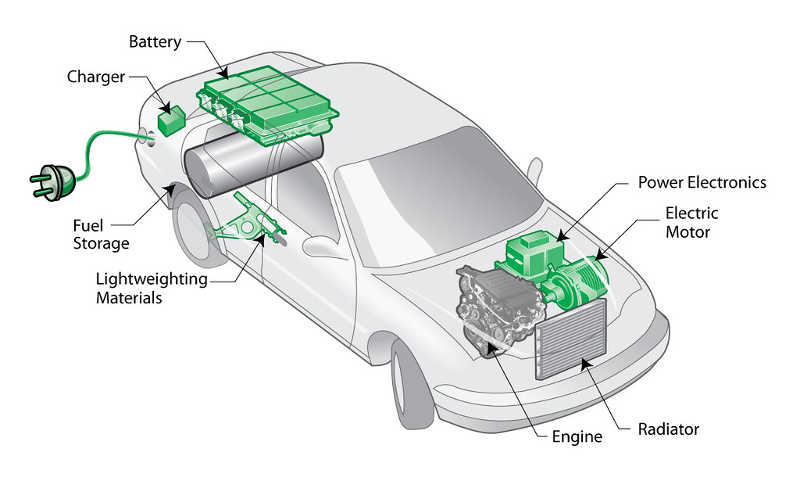
What's better, an Electric Car or a Hybrid Car? Curiously, the answer depends on the timescale that you want to use your car over. With the UK set to ban all new petrol and diesel car sales by 2030, more and more people are looking to hybrid vehicles to reduce their reliance on petrol (and for the fuel efficiency). With petrol/diesel cars likely to reduce in number leading up to the 2030 cut-off point, the cost of petrol will eventually rise as demand slowly decreases. Of course, depending on the level of future fuel reserves, it may be viable to keep running petrol/diesel cars for several decades after the cut-off, but it is likely that demand for electric vehicles will outstrip demand for petrol vehicles, making petrol stations less and less viable as businesses.
So which is better? For now, it's better to go for a hybrid car. As the cut-off point for sales of hybrid vehicles will last until 2035, most hybrid vehicles will be relevant well into the future, even when petrol/diesel cars are becoming less viable. In fact, they may even be easier to convert to fully plug-in electric vehicles, making them the perfect option to buy right now.
Electric cars and congestion charge
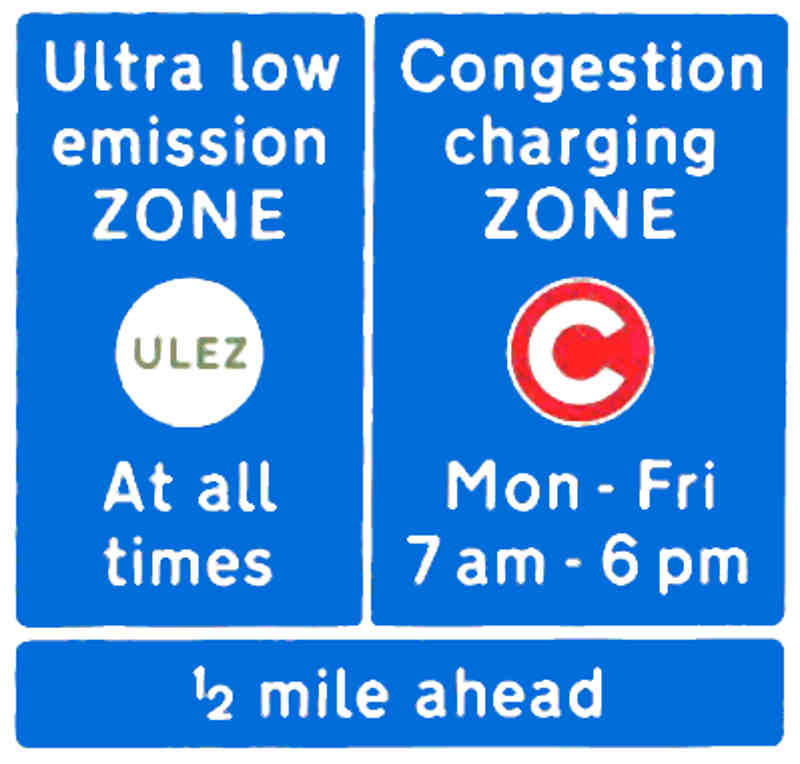
Fully Electric Vehicles ARE NOT subject to London Congestion Charge, or even its Ultra Low Emission Zone charge. Even when October rolls around and low-emission vehicles have to start paying congestion charge, EVs will still be exempt. This even applies to company vehicles, so the Congestion Charge will soon only be avoidable if you or your business switch to fully electric vehicles.
Electric cars and corporation tax
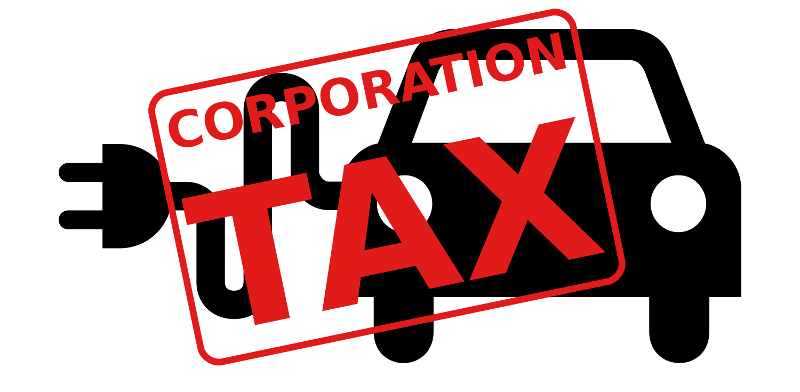
Any car purchased for a business can have its cost partly offset against the business's corporation tax bill. Usually this deduction will be applied over an extended period of time, but in the case of electric cars, a full tax deduction can be claimed in the same year of purchase.
Obviously, if you purchase an electric car with your own cash, your income will have already been subjected to income and corporation tax.
In the event that you are using a personal car for business journeys, you can claim 45p per mile for the first 10,000 miles, after which you can only claim 25p per mile. As electric vehicles are often more cost efficient, this may be a beneficial tax arrangement.
When will electric cars take over?

Experts estimate that by 2055, more than 95% of vehicles on the road will be electric, a calculation which takes into account the likely possibility that 100% of cars produced by 2040 will be electric.
According to the Financial Times, electric vehicle sales in Europe have overtaken diesel car sales for the first time in history, signalling the beginning of the end for petrol purchasers and the start of the electric era. With the UK government planning to ban the sale of new petrol and diesel cars by the year 2030, the stage looks set for electric vehicles to take over.
While many vehicles manufacturers are also looking to switch out the production of their petrol cars for electric vehicles, the reality is that it will take some time before the entire world runs on electric vehicles.
Can you have an electric car without a lithium battery?
Around 2.2 million litres of water is needed to create just one ton of lithium, and it's poorer countries who rely on farming who are paying the price. As a result, many people are looking at different ways to using lithium in a battery, and while there are some alternatives, the reality is that most are not yet economically viable. From seawater to sodium, and hemp to magnesium, there are many ways to make a battery, however many of these are simply not as light or efficient. So the answer is yes, it's theoretically possible to have an electric car without a lithium battery, but one will need to wait some time before seeing any change, and it's too early to tell.
Can electric cars be manual?

The short answer? Yes. Electric cars CAN be manual. The long answer? You're very unlikely to see it. Here's why:
Given the way that electric cars are designed, they are often most suited to being automatic vehicles. An EV battery can provide varying degrees of power to move a car, up until a certain limit. Given that this power supply can be increased to give the average electric car an RPM of up to 20,000, there is no need to shift gears, as the battery can continue to comfortably supply power beyond the average 6,000rpm range of a typical diesel or petrol car. In a petrol or diesel car, there is a requirement for gear-shifting because an engine can only spin so many RPM to turn the wheels before the wheels reach a speed beyond what the engine is capable of turning.
As the speed of the manual engine increases, it begins to reach its RPM limit, requiring a gear-shift, as it becomes less and less efficient to supply power to the wheels. A change in gears is required to change the gear ratio, which allows the engine to turn the wheels faster. Thus, each upwards change in gear allows the engine to supply power to the wheels within an acceptable and increased speed range, with each gear being efficient only within a certain range (usually between 1000 - 2500 RPM). Modern EV batteries, on the other hand, have just one gear because their RPM range can go much higher, and so they are able to sustain power to the wheels, even at high RPMs. But is it possible for an electric car to have more than one gear? Almost certainly.
One reason that most electric vehicles do not have gears is because it's simply cheaper to manufacture them without a full driveline system. In fact, many electric cars could benefit from having a driveline system, and some are even manufactured with two speed transitions (e.g. the Porsche Taycan), although even these cars are still automatically shifted, they simply use a gear change to maintain efficiency at higher speeds, so that the battery doesn't get overworked.
While all of these workarounds are still automatic, there are examples of manual gear-shifting in very high-level performance race cars in Formula E, where they can have between 3 and 4 different gears to maintain efficiency and performance.
In general, electric cars with one gear are more natural to use, more efficient, and much much cheaper to service, as the usual wear and tear that happens to the clutch system is non-existent in a one-gear electric vehicle.
Can electric cars tow a caravan?

Very few electric cars can tow a caravan legally, although many would be able to (albeit at a reduced range). In fact, the only available car in 2023 that can do so is the Tesla Model X, which will set you back a whopping £76,500. Furthermore, you shouldn't expect the same kind of range while towing say, a caravan, than you would normally. Given that the range of an electric vehicle while towing would be reduced to a point where they would simply look like bad investments, most electric car manufacturers simply opt out of being tested for towing capacity by the relevant european autorities, as it would be a publicity risk. Perhaps in the future, as the range of electric vehicles increases and the efficiency of the batteries goes up we will see more authorised vehicles with towing capacity.
However, that isn't to say that a Plug-in Hybrid Electric Vehicle (PHEV) couldn't tow a trailer. An example is the the Mitsubishi Outlander PHEV which is able to tow a 1.5 tonne payload. In fact, there are many PHEVs that can tow a trailer, some up to 2.8 tonnes, including the Volkswagen Golf GTE, the Audi A3 e-tron, the BMW X5 and 40e, the Volvo XC90 T8, and the Audi Q7 e-tron.
Why are Electric Cars Better Than Petrol Cars?
The Electric vs. Petrol Cars debate has been going back and forth since electric vehicles have started to make their way back into the mainstream automobile industry, but many are starting to believe that electric cars are the future, and are patently better than petrol vehicles. This isn't necessarily true, but there are some pros and cons of both.
1. They're more environmentally friendly (sort of).

Electric cars don't produce any of their own emissions, and instead are as environmentally friendly as the grid that supplies them. This means that for a country like Norway, with 98% of its energy coming form green sources, Electric cars charged on the grid are 98% green. On the flipside, the production cost of a battery is very high, and often produces high levels of CO2 especially for higher kWh vehicles.
This means that for an electric vehicle to become more environmentally friendly than a regular petrol car, it needs to be used for longer in order to offset the CO2 production costs associated with its production. For the Tesla Model 3, for example, you will have to travel 13,500 miles to offset the carbon footprint of its production. As production becomes more powered by green energy and batteries become more efficient, this associate carbon footprint should decrease, and there's no doubt that an electric vehicle when used regularly for more than a year is significantly better than a petrol vehicle in terms of environmental impact.
2. They're cheaper to run

The Electric Volkswagen ID.3 has a running cost of £0.062/mile compared to the diesel-powered Ford Focus which has a running cost of £0.12/mile per mile, which is nearly double the cost. In the long run, petrol costs will be driven higher by lowered supply, while energy grids will increasingly become more and more based around renewable energy. In an ideal world, that should lead to decreases in the cost per mile to run an electric vehicle.
3. They're cheaper to maintain

The typical petrol car has a number of expensive-to-replace parts like crankshafts and other engine parts, and has a tendancy to break down at some point, due to the metal-on-metal wear-and-tear that inevitably occurs. An electric vehicle has way fewer moving parts, having no gearbox, exhaust pipe or even clutches. Furthermore, the key part of every electric vehicle, the battery, is often insured with an extended warranty by manufacturers, giving EV drivers peace of mind.
4. They're the future

Energy must become renewable or we will simply run out of energy sources and civilisation will grind to a halt. In our international and interconnected age, travel will always be a necessity, and so it stands to reason that the only future for personal transport will lie in electric (or at least renewable) vehicles. Eventually, this will lead to lower consumer costs and will benefit everyone involved.
Why are electric cars bad?

While many tout Electric vehicles as an eco-friendly alternative to evil, petrol guzzling combustion-engine cars, the reality is that there are more downsides to the production and running of an electric car than you might first think. To start with:
1. They use Lithium in their batteries. A lot of it.

Lithium is a rare earth metal, and this huge hike in demand for it due to the electric vehicle industry has forced many countries (Argentina, China, Bolivia, Chile) to begin unsustainable mining practices that can harm the environment. On top of this, mining produces more CO2 than drilling for oil, adding to the CO2 production cost of a battery.
2. Electric car productions creates tonnes of CO2
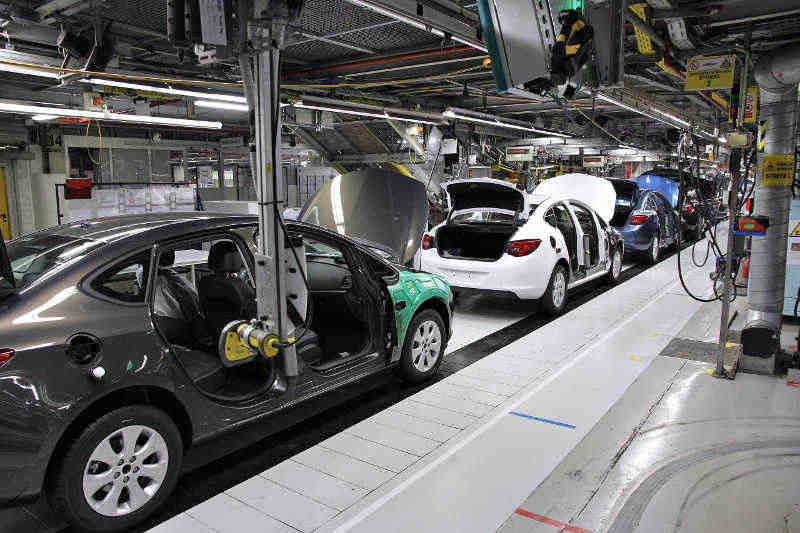
While the production of a standard petrol vehicle creates between 7 and 10 tonnes of CO2, the CO2 emissions caused by producing an electric car goes up substantially due to the batteries. In our modern capitalistic society, car manufacturers have been trying as hard as they can for decades to increase range and power in all of their vehicles so they can beat their competition. As 150kg of CO2 are released for every 1 kiloWatt hour (kWh) of battery capacity, cars like Tesla's 2018 Model S 100D will cause emissions of 15 additional Tonnes of CO2 in the production of the batteries alone. In fact, most electric cars often cause emmisions of CO2 between 2 and 3 times more than standard petrol cars.
3. Electricity isn't clean, and so neither are Electric Vehicles.


While there are some companies who focus on providing 100% clean energy to the grid, the reality is that the majority of energy provided to the grid comes from non-renewable energy sources. In the UK, for example, 57% of all mains energy comes from non-renewable sources. Of course, as countries lean further and further into relying on green technology, this percentage will decrease. In the last 8 years, the amount of sustainable energy produced for the mains in the UK has doubled, and this number is only set to increase. So while your electric vehicle might not produce its own emissions, the power sources behind it certainly does.
4. They're expensive to buy.

Although the cost of electric vehicles is going down, the reliance on expensive battery technology is still a major sticking point for most manufacturers. As a result, low price-range electric cars may suffer from decreased performance in the realms of range or charging speed, but as battery technology improves, this is set to become less of a barrier to entry. Furthermore, they're less expensive to service, and to charge, and the batteries are often very well built, with extended warranties. All in all, this decreases running costs, so electric vehicles should be viewed as a longer term investment.
5. More range? Higher Price
The average gas powered car has a range of 482 km, while most electric cars have a range of 200-490 km. At the higher end of electric vehicle range comes a much greater cost, with the premium Mercedes EQS 450+ with a range of 724 km coming in at a staggering £99,995-£113,995. To put that into comparison, the diesel powered 2018 Jaguar XF 20d has a range of 1176 km and costs only £38,000. Of course, with time, the cost of petrol will rise and the efficiency of batteries will increase, leading to more fuel efficiency for electric vehicles.
6. Where can I charge?
Unlike petrol stations which are a dime a dozen, many places in the UK are simply devoid of charging stations. This looks set to be the case across rural areas for the forseeable future, however, in urban centres, there are growing numbers of charging spaces. Given the different outlet and power types, it can be tough to know where to charge your vehicles but fortunately, ZapMap allows you to see every charger you can use, how much it will cost, and even whether or not the charger is vacant.
Can you drive an electric car without a license?
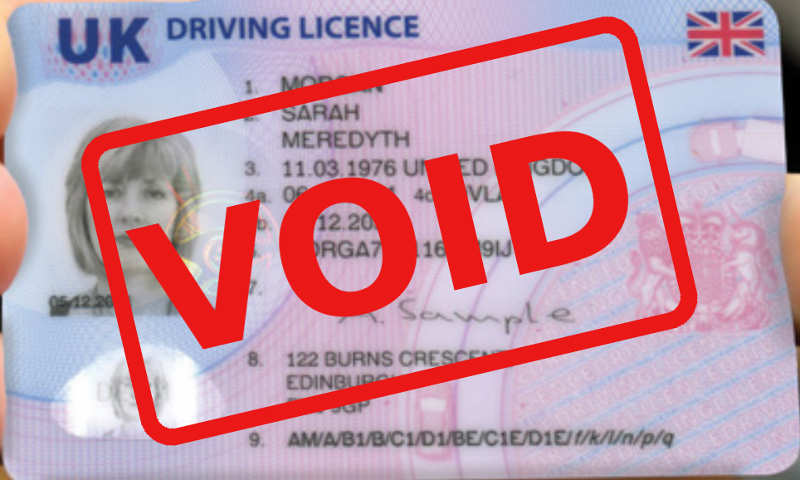
You cannot drive an electric car without a license, but there may be a loophole if what you're driving isn't technically a car. For example, the upcoming Citroën Ami is designed to be a quadricycle, and has a range of 43 miles and a top speed of 28mph, allowing it to fall under the vehicle designation bracket of "Quadricycle", meaning that people in certain European countries can drive it without a license. Unfortunately for Brits, this license-free courtesy has not been extended to people wanting to drive it in the UK. So unfortunately you'll have to stick to electric scooters if you want to go license free.
When were electric cars invented?
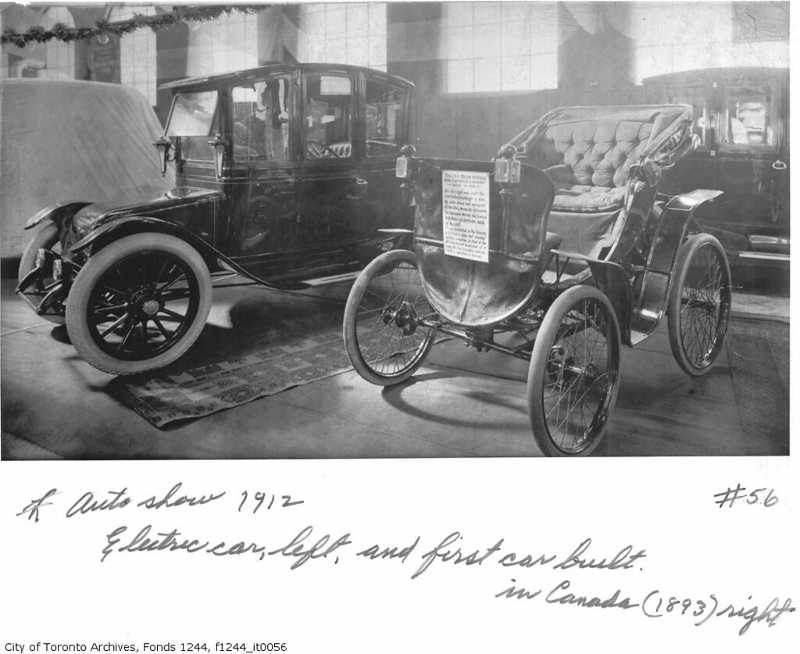
In 1832, the first electric car was made by Robert Anderson, predating the first gasoline powered car, which was the catchily titled "Vehicle Powered by a Gas Engine" (created in 1886 by Carl Benz, who's company later went on to become Mercedes Benz). This electric vehicle by Robert Anderson was fairly rudimentary in design though, and lacked practicality, and it was only until the 1870s that electric cars began to have any utility.
In 1884, Thomas Parker invented the first electric car available in the UK, in a design that was created to avoid the negative effects of coal-powered vehicles in terms of pollution. Thomas Parker was a prolific inventor who made huge developments in dynamos, lead acid batteries and four wheel drive in his vehicles.
In 1887, William Morrison created the first practical self-powered four-wheeled electric carriage. 12 were sold at $3,600 each, meaning that, if we adjust for inflation, the cars were worth about $110,000 in today's money. In fact, towards the end of the 19th century approximately one third of all cars were electric. Eventually, gasoline-powered vehicles became more popular, and it's only now in the 21st century that we are beginning to see a resurgence in electric vehicles.
SOURCES:
IMAGE SOURCES (in order of appearance):
Image Source: 2019_Tesla_Model_3_Performance_AWD_Front.jpg
Image Source: Kia_e-niro.jpg
Image Source: Volkswagen_ID3.jpg
Image Source: Nissan_Leaf_2018.jpg
Image Source: Audi_e-tron.jpg
Image Source: Hyundai_Kona_Electric.jpg
Image Source: Mini_Electric.jpg
Image Source: Renault_Zoe.jpg
Image Source: MG_ZS_EV.jpg
Image Source: Vauxhall_Corsa-e.jpg
Image Source: Tesla_Model_S2.jpg
Image Source: Charging Vehicle.jpg
Image Source 1: 2018_Tesla_Model_S_75D.jpg; Image Source 2: Audi_e-tron_GT_IMG_5689.jpg
Image Source 1: 2019_Tesla_Model_3_Performance_AWD_Front.jpg; Image Source 2: Polestar2%E2%80%93_f_02042021.jpg
Image Source 1: 2020_Tesla_Model_Y,_front_5.16.21.jpg; Image Source 2: 2021_Ford_Mustang_Mach-E_Standard_Range_Front.jpg
Image Source: 3463107424_a0f76f0855_b.jpg
Image Source: ULEZ_Congestion.jpg
Image Source: Formula_E.jpg
Image Source: Environment.jpg;
Image Source: Saving_money.jpg
Image Source: Car_Repair.jpg
Image Source: download_future.jpg
Image Source: Chuquicamata-copper-mine-in-Calama-Chile-courtesy-of-Earthworks.jpg
Image Source: 001Car_factory_assembly_line-_Opel_factory_in_Gliwice,_Poland.jpg
Image Source: Dirty_Energy.jpg
Image Source: High_Cost.png
Image Source: Electric_Car_Old.jpg